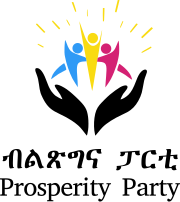

Prosperity Party | |
|---|---|
 | |
| President | Abiy Ahmed |
| Vice-Presidents | Adem Farah Temesgen Tiruneh |
| Founded | 1 December 2019 (2019-12-01) |
| Merger of | ADP ANDP APDO BGPDUF ESPDP GPDM HNL ODP SEPDM |
| Preceded by | EPRDF |
| Headquarters | Addis Ababa |
| Newspaper | New Vision |
| Membership (2022) | |
| Ideology |
|
| Political position | Centre[8][9] |
| House of Peoples' Representatives |
454 / 547
Nebe, Nebe
|
| Website | |
| prosperity | |
|
| |
The Prosperity Party (Amharic: ብልጽግና ፓርቲ, romanized: Bilits’igina Paritī; Oromo: Paartii Badhaadhiinaa) is a political partyinEthiopia that was established on 1 December 2019 as a successor to the Ethiopian People's Revolutionary Democratic Front (EPRDF) by incumbent Prime Minister Abiy Ahmed. The merger into a countrywide party is part of Abiy's general policy of distancing the country's politics from ethnic federalism.[10] It ran for the first time in the 2021 general election.
The Prosperity Party was formed and formally recognised by the National Electoral Board of Ethiopia (NEBE) in December 2019 through the merging of three former EPRDF member parties, the Amhara Democratic Party (ADP), the Oromo Democratic Party (ODP) and the Southern Ethiopian People's Democratic Movement (SEPDM). The Afar National Democratic Party (ANDP), the Benishangul-Gumuz People's Democratic Unity Front (BGPDUF), the Ethiopian Somali People's Democratic Party (ESPDP), the Gambela People's Democratic Movement (GPDM) and the Hareri National League (HNL) were also included in the merger.[11][12] The Tigray People's Liberation Front (TPLF), the only one not to join the new party, was critical of it upon its formation. The animosity between the two eventually escalated into the Tigray conflict in November 2020.[citation needed]
The program and by-laws of the party were first approved by the executive committee of the EPRDF. Abiy tweeted:
The unanimous decision passed today to merge the Party is a crucial step in harnessing our energy to work toward a shared vision. Prosperity Party is committed to strengthening & applying a true Federal system which recognizes the diversity and contributions of all Ethiopians.[13]
The Prosperity Party has been seen as supporting Ethiopian civic nationalism due to the merger of the Oromo Democratic Party with the Amhara Democratic Party, Argoba People's Democratic Organization, Benishangul-Gumuz People's Democratic Unity Front, Ethiopian Somali People's Democratic Party, Gambela People's Democratic Movement, Afar National Democratic Party, Hareri National League, and the Southern Ethiopian People's Democratic Movement ethnicity-based political parties into the new multi-ethnic party, thus moving these predecessor parties away from their ethnic nationalist and pro-ethnic federalism past into a party that promotes a unified Ethiopian national identity and non-ethnicity based federalism. However, this has been seen by opponents as steps towards the possibility of taking political powers based on group rights away from the various ethnic groups, while proponents see it as a way to move Ethiopian politics and governmental administration away from ethnicity-based identity politics, supporting the individual rights of each person, to mitigate the rise of ethnic nationalism, to foster national unity and solidarity, and to include in the democratic process political parties of several ethnic groups and regions that were once deemed too inferior by the TPLF-led Ethiopian People's Revolutionary Democratic Front regime to fully join the one-party dominated coalition government or be full partakers in revolutionary democracy because of their largely pastoralist way of life.[14][15][16][17][18]
The Prosperity Party (PP) exists along ethnic lines. There is an Amhara PP (APP), an Oromo PP (OPP), a Somali PP (SPP), a Sidama PP (SPP), and a Tigrayan PP, led by Nebiyou Shulmichael[19] and of which Abraham Belay[20] and Mulu Nega are prominent members. Many other ethnic groups have their own PP branch as well. There exists a substantial divide between the Oromo and Amhara wings of the party, with academic Tobias Hagmann noting that the two sides are largely kept together through opposition to the TPLF.[21]
The Tigrayan PP is in strong conflict with the TPLF as it has supported Abiy Ahmed in the Tigray War. Due to this war, the Tigray PP has become isolated in Tigrayan public opinion to the point that one of the regional PP leaders, Abraham Belay, was forbidden by his own mother to visit her house and her neighbourhood.[22] In March 2021, the Oromia Prosperity Party (OPP) and Amhara Prosperity Party (APP) came with opposite statements, each blaming the other for being the cause of violence and killings.[23][24]
The party's logo consists of two black hands holding three human figures (one blue, one yellow, and one pink), with sun rays shooting outwards from the human figures.
| Election | Leader | Seats | Government | |
|---|---|---|---|---|
| Seats | +/- | |||
| 2021 | Abiy Ahmed |
410 / 483
|
Majority | |
The Prosperity Party has increasingly accused of spreading anti-intellectualism, associated with the cult of personality of Abiy Ahmed and his sectarian sentiment known as "Prosperity Party Gospel". Abiy's undisputed leadership shifted to ethos of prosperity gospel philosophy. Its members also accused of propagating fallacious statements regardless of reality behind the current Ethiopian situation.[25] With Abiy's premiership, Ethiopia has been transformed into authoritarianism and experienced periodical intrastate conflicts.[26] In January 2021, the Prosperity Party conducted evaluation meetings amidst clashes in Benishangul-Gumuz Region and Oromia, which was criticized for not stopping "massacres of innocent civilians".[27]